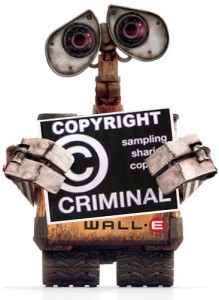Copyright is an issue discussed in many churches far less than it ought to be. I have seen countless examples of churches breaking or ignoring copyright law, mainly for one of two reasons:
- Ignorance of the copyright laws
- The belief that because of its non-profit status or overall ‘good intentions’ the church is somehow exempt from certain laws
Of course, it should go without saying that neither of these are valid reasons for breaking copyright law or any laws for that matter. But somehow this one seems to slip through the cracks.
So what can we, as a church, do to protect ourselves and protect and honour the producers of materials that we wish to use? How can we use materials fairly while respecting those who used their time and talents to produce them? How can we understand what copyright law covers and what is available for Fair Dealing?
At the root, education is the key. Ignorance of the laws simply cannot be an excuse. I for one have unfortunately broken copyright laws because of my personal lack of understanding. As such, I have recently taken it upon myself to begin to educate myself about copyright law. Realizing how little I know, I was inspired to write about the experience and share the knowledge that I discovered.
Why Copyright Law?
Copyright laws exist to protect content creators and ensure that they receive fair compensation for their work, which may also be their livelihood. The term Fair Use is an American term and is often used in explaining copyright law, but Canada has a slightly different approach called Fair Dealing.
When considering Fair Dealing, there are a number of things to keep in mind:
- The Purpose of the Dealing Is it for research, private study, criticism, review or news reporting? It expresses that “these allowable purposes should not be given a restrictive interpretation or this could result in the undue restriction of users’ rights.” In particular, the Court gave a “a large and liberal interpretation” to the notion of research, stating that “lawyers carrying on the business of law for profit are conducting research”.
- The Character of the Dealing How were the works dealt with? Was there a single copy or were multiple copies made? Were these copies distributed widely or to a limited group of people? Was the copy destroyed after being used? What is the general practice in the industry?
- The Amount of the Dealing How much of the work was used? What was the importance of the infringed work? Quoting trivial amounts may alone sufficiently establish fair dealing as there would not be copyright infringement at all. In some cases even quoting the entire work may be fair dealing. The amount of the work taken must be fair in light of the purpose of the dealing.
- Alternatives to the Dealing Was a “non-copyrighted equivalent of the work” available to the user? Was the dealing “reasonably necessary to achieve the ultimate purpose”?
- The Nature of the Work Copying from a work that has never been published could be more fair than from a published work “in that its reproduction with acknowledgement could lead to a wider public dissemination of the work – one of the goals of copyright law. If, however, the work in question was confidential, this may tip the scales towards finding that the dealing was unfair.”
- Effect of the Dealing on the Work Is it likely to affect the market of the original work? “Although the effect of the dealing on the market of the copyright owner is an important factor, it is neither the only factor nor the most important factor that a court must consider in deciding if the dealing is fair.” http://en.wikipedia.org/wiki/Fair_dealing#Canada
Individuals, churches and other organizations may use these categories determine whether they may use copyright materials. Although during my time in the church, I must admit, I have witnessed many obvious violations to these rules due to either ignorance or arrogance.
To help individual churches and priest conform to copyright law in Canada, what follows is some general infractions that occurs and some general information of how to comply with copyright law.
Images
General
When looking for images for a website, blog post, sermon series or poster, the first instinct of many churches is to do a google search and take the first image found. This is easy, but it’s also a violation of Fair Dealing.
Many artists are willing to allow free use of their images but require acknowledgement of their work. This creates traffic back to their portfolio and can increase sales and provide for their livelihood.
Something also to consider, is some artist will allow certain organizations to use their materials for free but not others. Artists are allowed to determine the “moral” use of their images. For instances, an atheistic artist may allow free use of his/her image except for religious organizations.
Even when an image is free, it is best to check with the artist or read the parameters that govern the use of the image.
Images in Sermons
Using a photographer’s pictures or a designer’s Photoshop files in a sermon PowerPoint presentation, may be allowed, but only if acknowledgement of the artist is sited at the end of the presentation or the artist has given permission for its use.
Images in promotional materials
Using unauthorized images in church flyers for a parish event would constitute copyright infringement even if acknowledgment were given to the artist. In this case permission from the artist is needed or the image needs to be purchased.
Solution
When it comes to images, there is a wealth of free resources online. http://www.christianphotos.net/, http://www.creativemyk.com/ and sxc.hu are excellent starting points for churches looking for royalty-free images.
If you have an image that you want to use but don’t know where it came from, http://www.tineye.com is a website that can help find the original source of the image. Once you know that, you can ask permission or determine if using it would be considered Fair Dealing.
Films
Pizza and Movie night or Film and Discussion groups are a common educational tool in many churches. But often, these are in direct violation of copyright law and Fair Dealing.
These free nights affect the market value of the copyright work.
Solution
Fortunately, there is once again a simple solution. A licence to show many movies at church events will cost only between $60-205, depending on your church’s size. http://canada.cvli.com/main.cfm
Music
Most churches though do purchase a One License or CCLI. (http://www.onelicense.net/ or http://www.ccli.com/). Somehow, music copyright has been impressed in us more than other forms of media. However, infringements still occurs when a priest or pastor wants to add in a new piece of music or make changes to a piece without due diligence.
For instance, changing content (substituting words) to appeal to a particular theology violates copyright law. The new piece of music would be considered derivative work.
Solution
In this case, awareness is key. Understanding the terms of use of the licence that the church owns and following it will solve most if not all of the music broadcast issues.
For recorded music, a SOCAN licence can be purchased from http://www.socan.ca/. This license will allow previously recorded music to be played at your event, such as WOW Praise music played during a dinner or such.
Why it is important
Why is it so important for churches and church leaders to adhere to the Canadian Copyright Law? Aside from protecting the rights of the artist, it becomes an issue of hypocrisy. If we wish to speak ethically about the world then we simply must comply with the laws and not circumvent them when it becomes burdensome.
The Christian life requires constant diligence and this is especially true for the leaders of a Christian community. After all, if we can’t bother to adhere to the law, then why would the parishioners listen to our message? As Christ lived as an example, so to must the church.
The longer that the church compromises copyright law the more damage is done to our reputation. We begin to lose our credibility to speak ethically to a society, about how we ought to be as a people, a culture and civilization. In many cases we quickly begin to resemble the Pharisees that Jesus denounced. And once our reputation begins to suffer, the more irrelevant we become.


I am very impressed by this post; I would be interested to see whether Ottawa has any kind of teaching about copyright law.
I think every diocese should. Unfortunately we don’t. We have the odd workshop on music, but that is it.
This raises one interesting question about ‘Christian copyright’, if the Bible is the word of God, and God, nor his son are dead then can the Bible be used, reprinted or quoted without obtaining the permission of the author?
Sorry but it is a valid question and I am a firm believer.
Interesting question, but I don’t think God or His Son is subject to human laws.
And since the bible as word of God is a gift from God, gifts are not subject to copyright law anyways.
And then there is the point that God’s grace and mercy, received through his word (both the Bible and the word made flesh) is free.
Three answers to your question….sorry couldn’t resist the Trinitarian symbolism.